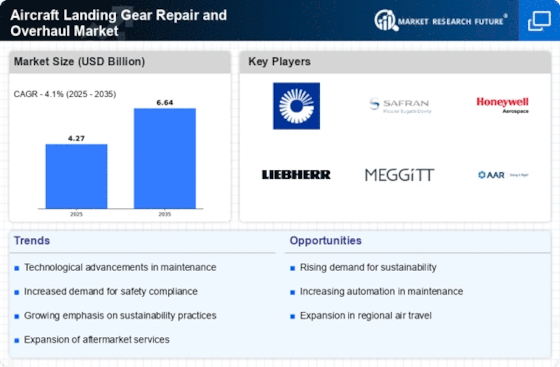Regulatory Compliance
The Aircraft Landing Gear Repair and Overhaul Market is heavily influenced by stringent regulatory requirements imposed by aviation authorities. Compliance with safety standards is non-negotiable, compelling airlines and maintenance providers to prioritize landing gear inspections and repairs. Regulatory bodies mandate regular maintenance checks, which include thorough assessments of landing gear components. This regulatory landscape creates a consistent demand for repair and overhaul services, as non-compliance can lead to severe penalties and operational disruptions. The Aircraft Landing Gear Repair and Overhaul Market must adapt to evolving regulations, ensuring that service providers are equipped to meet these requirements. As regulations become more rigorous, the market is likely to see an uptick in demand for specialized repair services that adhere to the latest safety standards.
Increasing Air Traffic
The Aircraft Landing Gear Repair and Overhaul Market is experiencing a surge in demand due to the increasing air traffic worldwide. As more airlines expand their fleets to accommodate rising passenger numbers, the need for efficient maintenance and repair services becomes paramount. According to recent data, air traffic is projected to grow at a compound annual growth rate of approximately 4.5% over the next decade. This growth necessitates a robust landing gear repair and overhaul infrastructure to ensure safety and reliability. Airlines are investing significantly in their maintenance capabilities, which directly impacts the demand for landing gear services. Consequently, the Aircraft Landing Gear Repair and Overhaul Market is poised for expansion as operators seek to enhance operational efficiency and minimize downtime.
Technological Innovations
Technological advancements are reshaping the Aircraft Landing Gear Repair and Overhaul Market, introducing new methodologies and tools that enhance service efficiency. Innovations such as advanced materials, automated inspection systems, and predictive analytics are becoming increasingly prevalent. These technologies not only improve the accuracy of inspections but also reduce turnaround times for repairs. For instance, the integration of 3D printing technology allows for the rapid production of replacement parts, streamlining the overhaul process. As airlines and maintenance organizations adopt these innovations, the Aircraft Landing Gear Repair and Overhaul Market is likely to witness a transformation in service delivery. The ongoing investment in technology is expected to drive growth, as operators seek to leverage these advancements to optimize their maintenance operations.
Rising Fleet Modernization
The Aircraft Landing Gear Repair and Overhaul Market is benefiting from the trend of fleet modernization among airlines. As older aircraft are retired and replaced with newer models, the demand for specialized landing gear services is expected to rise. Newer aircraft often feature advanced landing gear systems that require specific expertise for maintenance and repair. This shift towards modern fleets necessitates a corresponding evolution in the capabilities of repair and overhaul providers. The Aircraft Landing Gear Repair and Overhaul Market must adapt to these changes, ensuring that service providers are equipped with the knowledge and tools to handle the complexities of modern landing gear systems. As airlines continue to modernize their fleets, the market is likely to experience growth driven by the need for specialized services tailored to contemporary aircraft.
Focus on Safety and Reliability
Safety and reliability remain paramount in the Aircraft Landing Gear Repair and Overhaul Market, driving demand for high-quality maintenance services. Airlines are increasingly aware that the integrity of landing gear is critical to overall flight safety. As a result, there is a heightened focus on ensuring that landing gear systems are maintained to the highest standards. This emphasis on safety translates into a willingness to invest in comprehensive repair and overhaul services. The Aircraft Landing Gear Repair and Overhaul Market is responding to this demand by offering enhanced service packages that prioritize reliability and performance. As safety concerns continue to shape industry practices, the market is likely to see sustained growth, with operators seeking trusted partners for their landing gear maintenance needs.



















Leave a Comment